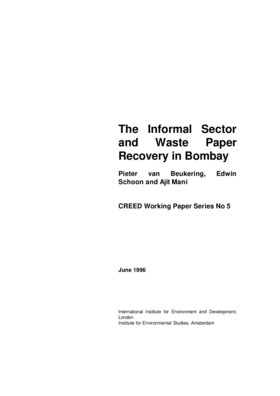Informal Sector and Waste Paper Recovery in Bombay, The

The lack of raw materials is considered to be one of the main constraints to a comprehensive recycling industry in the South. This paper looks at the possibilities for increasing recyclable waste recovery in developing countries, focusing on Bombay, India. First, a literature study provides a general introduction to the problems of solid waste and recovery in developing cities. Based on field surveys in the informal recovery sector and literature on formal waste collection, a simulation model for the solid waste flows in Bombay is developed. Two policy options under varying degrees of public response are considered: the encouragement of the existing informal recovery sector and the introduction of a Western style recovery system. Extrapolations of four different effects are presented for the period until 2010: formal and informal employment, environmental impact, public expenditure and income distribution. Promoting informal recovery seems to be a more cost-effective and environmentally optimal policy measure: investment requirements are minimal while landfill costs are reduced; employment effects are also positive because of the high labour intensity of informal waste recovery. However, the impact on income distribution is worse than a Western-style policy.
Cite this publication
Available at https://www.iied.org/8124iied